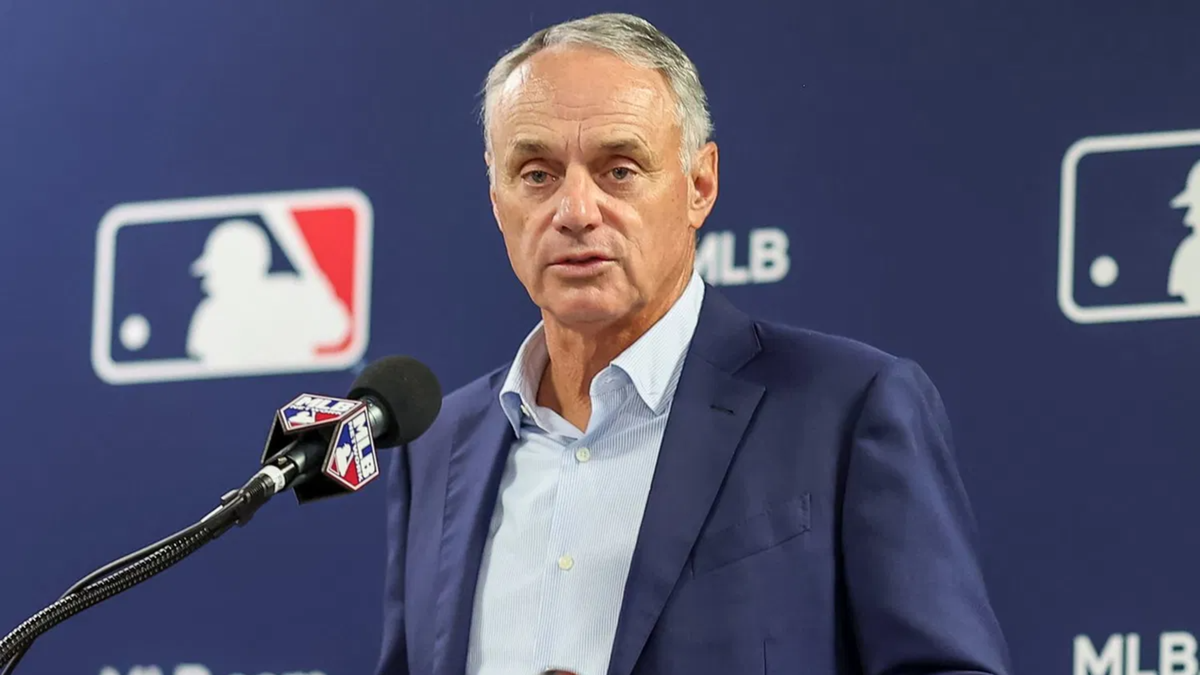
Imago
Image: MLB.com

Imago
Image: MLB.com
For weeks now, the boom of unrest has roared through MLB circles. At the center of it all? The commissioner warned that the league’s current financial model is “no longer sustainable.” Rob Manfred did not sugarcoat it, highlighting falling media deals, deepening payroll disparities, and a growing sense that the game is losing its competitive balance. His proposed fix? A sweeping economic overhaul that includes opening talks on a salary cap, something that has always been a red flag for athletes and purists alike.
Watch What’s Trending Now!
However, the backlash did not come quietly. Former Red Sox veteran David Fry, better known online as Fryedaddy, replied to Rob Manfred’s latest remarks with a direct and public challenge. Retweeting Front Office Sports’ tweet, which pointed out Manfred’s comments, “Rob Manfred says the state of baseball is no longer sustainable. The MLB commissioner is calling for a sweeping overhaul to the league’s economics as RSNs crumble and competitive balance concerns grow,” Fry added just one sharp tag: “#FireManfred.” And just like that, a wave of kickback surged across social media, echoing frustrations that have been simmering beneath the surface all season.
#FireManfred https://t.co/VNabjF0S6T
— Fryedaddy/Frito (@shegone03) July 20, 2025
Transitioning from the tweet to the boardroom, the pressure around Manfred’s comment has not let up. At a closed-door meeting with the Baseball Writers’ Association of America, he doubled down on his economic concerns, citing massive changes in the regional sports network model and pointing out that the top 10 percent of stars now earn nearly 75 percent of all MLB salaries.
While he claimed that the aim is balance and long-term sustainability, critics, most notably MLBPA head Tony Clark, called the suggestions a smokescreen for collusion. “A cap is not about growing the game… a cap is about franchise values and profits,” Clark remarked.
And that is exactly why voices like Fry’s are hitting a nerve. For some veterans and fans, this is not about one commissioner; it is about a growing disconnect between the business of MLB and the people who have carried its legacy. The tension is real, the stakes are rising, and the calls for transformation—this time from the stars themselves—are growing louder than ever.
While the calls for accountability captured headlines, the larger picture behind this turmoil is far more intricate, and it is unfolding behind closed doors in high-stakes meetings with media moguls and league executives.
MLB’s broadcast future hangs in the balance as Rob Manfred targets a 2028 reset
The commissioner is not just trying to endure the storm; he is trying a total reset. Following ESPN’s decision to walk away from several cornerstone broadcast rights after 2025, Manfred has stepped in to reshape the league’s media landscape. From direct production of local games in struggling markets, like the Diamondbacks and the Padres, to high-level conversations at the Allen & Co. Conference in Sun Valley, MLB is now working to secure a unified media rights deal that extends through 2028.
Manfred believes that this centralized media model, mixing both national and local rights, will offer flexibility in a fragmented broadcast world. “It’s not a goal I’m pursuing in and of itself,” he said about MLB taking over broadcasts, “but rather an interim step.” The final vision? Full control over rights distribution, so MLB can enter future negotiations with a clean slate and a more valuable media package. But that vision is still filled with uncertainty, especially with the regional sports networks’ collapse and irregular fan engagement.
Yet as the league has reached a new era, the strategy is not just about money; it is about perception. Manfred has highlighted broadcasting and collective bargaining as vital to team valuations, even suggesting that MLB’s current system is to blame for slow growth compared to other leagues. While some owners are onboard, critics argue these moves could undermine market individuality and suppress local fan connections. And with ESPN still possibly circling for a reworked deal, the window for clarity is tappering swiftly.

USA Today via Reuters
Feb 15, 2024; Tampa, FL, USA; MLB commissioner Rob Manfred talks with media at George M. Steinbrenner Field. Mandatory Credit: Kim Klement Neitzel-USA TODAY Sports
As frustration grows among veterans like Fry and fans alike, Manfred finds himself at a critical crossroads. From blazing hashtags to fractured media rights, the calls for change are echoing louder than ever. Whether this sweeping overhaul stabilizes baseball or sparks deeper divides remains to be seen. For now, all eyes are on the league office and the next move they make. Stay tuned as MLB’s power struggle plays out both on and off the field.

